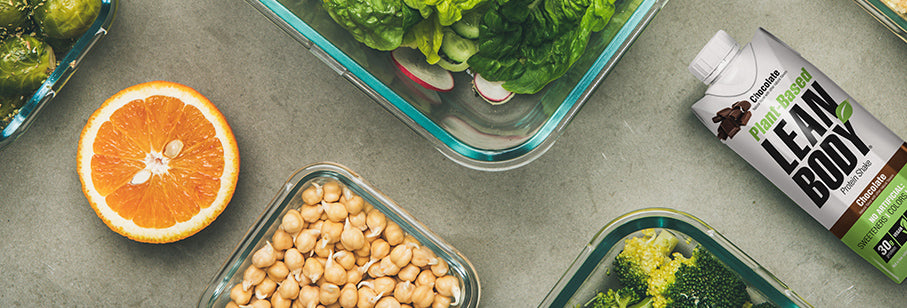With so many nutritional and health fads coming at us from TV infomercials, radio ads, Instagram influencers, and fitness magazines, it’s definitely difficult to separate the wheat from the chaff when it comes to optimizing our health. After all, how can we be sure that what’s trending now is really healthy for us?
One trend that has gained momentum over the last five years is the plant-based diet. We know this group of dieters as vegans: those who remove all animal products (including honey and gelatin) from their diets. For some, the decision to go vegan stems from an animal cruelty stand-point. Others may become vegans in an effort to help protect the environment. However, the main reason people decide on a vegan lifestyle is health-driven: they are looking for a way to prevent the onset of the chronic diseases that are so prevalent in today’s society.
Pros: Health Benefits
Making the decision to become a vegan for health reasons is not without strong scientific justification. In fact, many studies have shown that adopting a vegan diet can not only prevent chronic diseases such as diabetes, cardiovascular disease, and certain cancers, some research has shown that a plant-based diet can stunt and actually reverse the effects of these diseases! For example, two separate studies (conducted in Netherlands and Brazil) researched the effects of a plant-based diet on coronary heart disease. The scientists found that those who ate a diet that relied heavily on plant-based sources of protein vs. animal-based sources were much less likely to develop plaques in their arteries and as such, less likely to die of heart-related diseases later in life.1
Another compelling body of work focused on the possible positive effects of a plant-based diet on breast cancer. Dr. Michael Gregor, author of How Not to Die and the founder of Nutritionfacts.org, points to a study carried out by a group of scientists at the UCLA Department of Physiological Science. The purpose of the research project was to determine whether or not a plant-based diet, along with a moderate-intensity exercise program, would have an effect on breast cancer risk factors. The study focused on three groups of individuals:
1. Those who followed the Standard American Diet (SAD) and were sedentary.
2. Those who followed the SAD and exercised at high intensity.
3. Those who followed a plant-based diet (PBD) and exercised at a moderate intensity.
Each group had followed their particular diet/exercise protocol for an average of 14 years. Their blood was drawn and dripped on breast cancer cells in a petri dish. The results of the study were stunning!
As predicted, the blood of those who ate the SAD and were sedentary had no effect on apoptosis of the cancer cells. The blood of those who worked out vigorously on a daily basis and ate the SAD diet had some influence, triggering apoptosis of cancer cells 50% more than the blood of the SAD/sedentary group. And the plant-based, low to moderate intensity group? Their blood was 100% more effective at killing breast cancer cells than the SAD/sedentary group and approximately 50% more effective than the SAD/high-intensity group!2
So how does the blood of a vegan become its own weapon against cancer cell growth? What many studies have determined is that plant-based proteins don’t trigger the cancer-promoting growth hormone IGF-1 (Insulin-like Growth Factor) in the same way animal proteins do. Therefore, the incidence of all cancer types tends to be lower in vegan populations in comparison to those populations that use meat as a primary protein source.
Cons
With powerful research results such as those mentioned above, is it any wonder that people are turning to a plant-based life? Unfortunately, many of those who jump on board the vegan bandwagon do so without fully researching how to make the transition properly. For starters, many vegans make as many unhealthy food choices as a non-vegan. Sometimes these choices are deliberate and sometimes, they are a consequence of manipulative food marketing. Consider the abundance of meat substitutes marketed to the plant-based population. For example, one extremely popular meatless burger is 240 calories per 4 ounce serving and contains 14 g of fat, of which over half is saturated fat. So by calorie, this healthy vegan option is 53% fat. In comparison, a similar portion size of chicken breast is 142 calories and contains 3.1 g of fat, of which only 0.9 g is saturated. The chicken breast is also higher in protein (26 g vs. 17 g in the meatless burger) and lower in sodium (64 mg vs. 370 mg).
What about those frozen dinners that target the vegan population? If you’re craving Chinese and are a vegan, then one popular brand has a dinner for you: Chinese noodles and veggies. However, this healthy alternative to the real deal comes in at 450 calories, has 23 g of fat (46% fat by calorie), and it contains a whopping 790 mg of sodium per serving! If you’re not vegan and are simply looking for a frozen convenience, you may choose a similar frozen meal from another popular brand: garlic sesame noodles with beef. This product comes in at 300 calories, has 6 g of fat (18% fat by calorie), and 650 mg of sodium. So is the plant-based frozen option necessarily better for the health of the consumer? Not really.
Secondly, many who jump into the vegan lifestyle are unaware of the vitamin and mineral deficiencies that can occur as a result of foregoing animal products. While it’s true that most of our micronutrient needs can be met on a plant-based diet, there are a few that are only available to us through animal products or through fortified foods. Vitamin B12 is the deficiency most associated with vegans. This vitamin is necessary for the proper formation of red blood cells, proper neurological function, and DNA synthesis. Some vegans claim they can get adequate B12 through fermented foods, spirulina, certain mushrooms, and sea vegetables. However, Julieanna Hever, MS, RD, CPT notes that fortified foods are not dependable when it comes to achieving adequate amounts of B12, and the other foods mentioned do not contain the biologically active form of the vitamin.
Another important vitamin that many vegans are deficient in is Vitamin D. Known as the “sunshine vitamin,” Vitamin D is produced in our skin upon exposure to the UVB rays of the sun, and then activated by the liver and kidneys. Omnivores can get some Vitamin D from animal liver, oily fish, egg yolks, and red meat. The only viable plant-based source of Vitamin D for vegans is mushrooms; otherwise, they have to rely on fortified foods or supplements. Other microminerals that may be deficient in a plant-based diet are calcium, iron, iodine, and zinc.
Easing in
The cons of a plant-based diet can be avoided, however, by consulting with a nutritionist who is experienced with working with vegans, by doing your own research, or by easing in as you learn more about the lifestyle. Contrary to popular belief, the words vegan and vegetarian are not interchangeable. Vegetarians come in all different forms: ovo-vegetarians eat eggs alongside their plant-based foods; ovo-pescatarians include eggs and fish into their diets; and lacto-ovo-pescatarians eat almost anything except meat and poultry. One of these vegan options may work best for the person who wants to be on a plant-based diet but still feels uneasy about taking the plunge full-throttle.
Another way to ease into a plant-based diet is to begin substituting some of your animal products with comparable plant-based products. For example, instead of milk, you could try unsweetened almond or oat milk. Instead of a milk-based protein supplement, you could choose a plant-based one such as Labrada Nutrition’s new plant-based ready-to-drink protein shake. Instead of ground beef, you could try plant-based crumbles derived from soy or wheat gluten. There are even substitute eggs in powder form that are useful for baking recipes!
By moving into a vegan diet slowly, you will have the opportunity to make sure you are taking the proper supplements in the proper amount that will be missing from your new lifestyle. Plus, you will be able to make a more informed choice on what foods to choose in order to keep your vegan diet one that is truly beneficial to your health.
Conclusion
Make no mistake: plant-based diets have been put to the test and done right and they have many health benefits. In fact, a majority of the Blue Zone areas in the world (Sardinia, Italy; Loma Linda, California; Nicoya, Costa Rica; Okinawa, Japan; and Ikaria, Greece) lean heavily plant-based. However, like anything new and trendy, it is important that you first arm yourself with the right information before jumping head-first into a new lifestyle that is completely different from what you are used to. In the end, you must let food be your medicine. So whether you are an omnivore or a vegan, your food choices — nutrient-dense vs. nutrient-poor — will ultimately determine whether or not you will reap the health benefits touted by any diet plan.
References – Click Here.
Please Let Us Know If You Enjoyed This Article.
Your Feedback Is Important To Us
Disclaimer: This content is for informational purposes only and is not meant as medical advice, nor is it to diagnose or treat any medical condition. Please consult your physician before starting or changing your diet or exercise program. Any use of this information is at the sole discretion and responsibility of the user.













